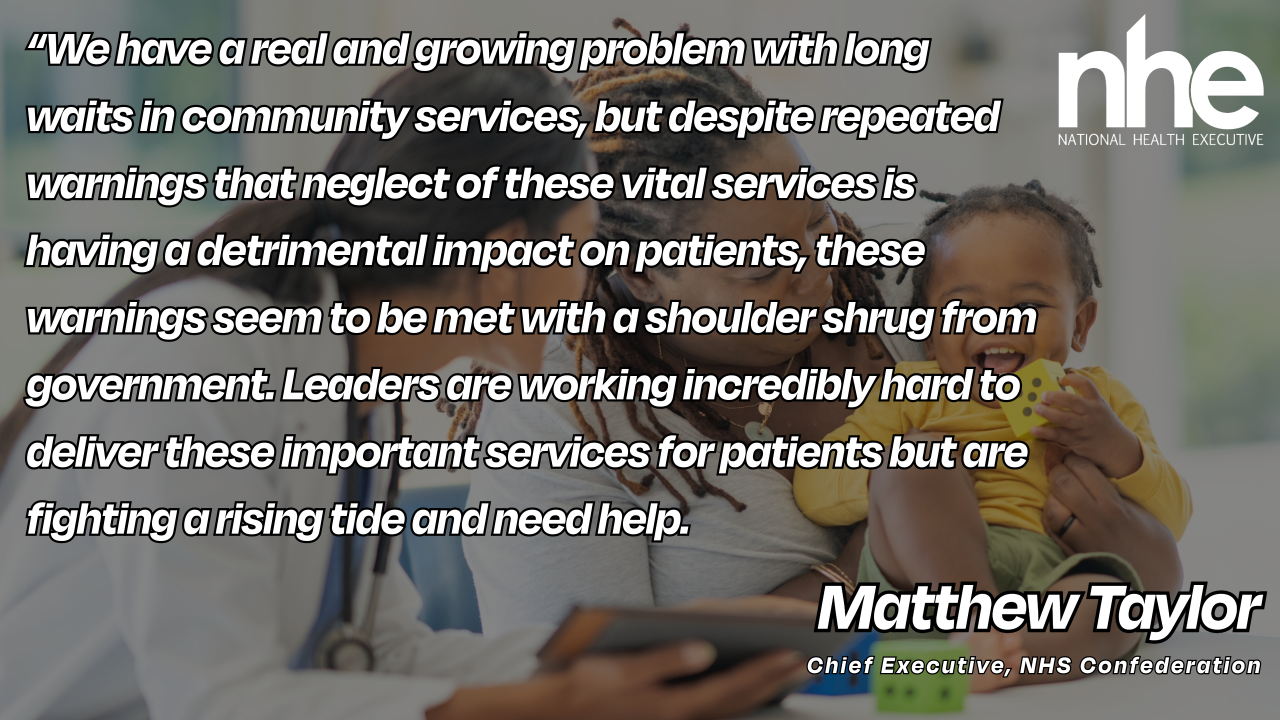The Community Network, which is jointly hosted by the NHS Confederation and NHS Providers, has stated that under-resourced community health services are risking the development of children and young people, as waiting lists hit one million for the first time.
These fears have led to health leaders urging action, with mental wellbeing and social development of children and young people at risk of being halted.
According to community paediatric service leaders, urgent cross-government action must be taken to ensure that young people can avoid longer waiting times. The backlog number in community health services has finally ticked over the one million mark, with this bringing a 10% increase since this time last year and a disproportionate number of these being children. With one in five of people stuck on waiting lists being young, health leaders are urging action as the potential consequences “need as much attention as hospital-based care.”
NHS England data is identifying that the longest waits among community services are for children and young people’s paediatric services, with some of the most crucial services being delayed. These delays are being seen across the diagnosis and management of children with complex care needs that include autism and developmental delays, leading to distress and potential damage. Alongside complex care needs, these services are essential in helping children and young people to live well, with essential services such as district nursing, sexual health, podiatry, and end of life care falling under this umbrella.

Chief Executive of the NHS Confederation Matthew Taylor said:
“We know that long waits can often impact outcomes for children more severely than adults because delays in assessment and treatment have a knock-on effect on communication skills, social development and educational outcomes as well as their mental wellbeing. So, the longer children are kept waiting, the more it will affect their development, and we know that vulnerable communities are impacted disproportionately.
“We have a real and growing problem with long waits in community services, but despite repeated warnings that neglect of these vital services is having a detrimental impact on patients, these warnings seem to be met with a shoulder shrug from government. Leaders are working incredibly hard to deliver these important services for patients but are fighting a rising tide and need help.
“The Community Network’s survey from earlier in the year found that in some areas waits for care are now so long that a 12-year-old experiencing issues might not receive treatment until they are 16. No one should be waiting that long.
“The government must take meaningful action, with the Autumn Statement an ideal time to grasp the nettle, and leaders want to see investment in prevention and early intervention, along with more national funding similar to the Elective Recovery Fund to help get back on track.
“There is an ever-growing consensus, along with a strong economic case, that we need to achieve the NHS’ long-term aim of improving prevention and shifting care away from hospitals and back into the community, where patients want to be treated. A significant step towards doing that would be enabling under-resourced community services to bring down the number of patients waiting for care, particularly children and young people.”
Some progress has been made with regards to reducing the waiting lists in some children’s services in the last year, with these including speech and language, occupational therapy, and support for long-term conditions, however, other services have seen significant increases. Vision screening, orthotics services and community paediatric services have all seen increases over 40%, which is a larger increase than any adult service.
Sir Julian Hartley, Chief Executive of NHS Providers, added:
“Too many children and young people risk falling through gaps, particularly after the pandemic. Delays in diagnosis, treatment and care can significantly affect their mental and physical health and wellbeing. Getting help and support to children and young people in need as early as possible is vital for their future life chances and to tackle inequalities.
“Community services are working flat out to see more people more quickly and making great progress in many areas but demand for children and young people’s services is still stubbornly high – making it really hard for providers to turn the tide amid staffing shortages and without further support.
“Without more cross-government support and focus lots of youngsters, their families and carers will continue to be hit by long waits for the treatment and support they need.”
If you want to know more about how the NHS is tackling waiting lists, sign up to National Health Executive's Backlog event.
Image credit: iStock



















